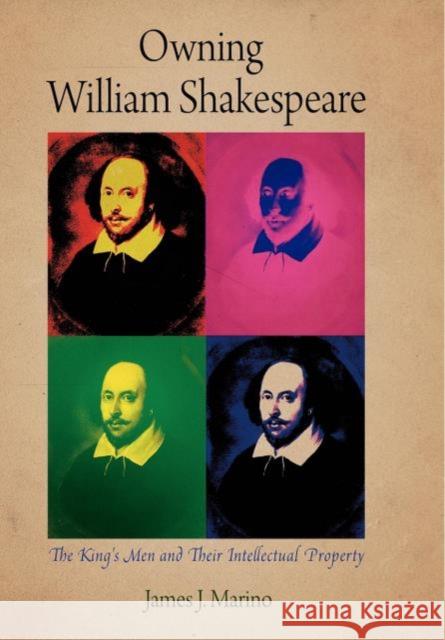Owning William Shakespeare: The King's Men and Their Intellectual Property » książka
Owning William Shakespeare: The King's Men and Their Intellectual Property
ISBN-13: 9780812222548 / Angielski / Miękka / 2013 / 216 str.
Owning William Shakespeare The King's Men and Their Intellectual Property James J. Marino "Who, in the early modern period, laid claim to owning Shakespeare's plays? How did the property regimes of print and performance determine the nature of such claims? In tackling these questions, James J. Marino scores some palpable hits."--TLS "Expertly blending literary criticism, performance theory, and historical analysis of intellectual property, Marino masterfully argues for the important role the Chamberlain's Men/King's Men played in vigorously maintaining their ownership in and the authenticity of Shakespeare's plays."--Choice "A thematically dense, insightful book that will engage readers interested in the origins and evolutions of intellectual property law, of the business of early modern drama, and of textual transmissions and adaptations."--Early English Studies "In this fascinating study, which brings together literary and textual studies, book and theatre history, the story of how Shakespeare's plays came to be created and known as his is told as a story of the King's Men and their property. Focusing on how intellectual property was created and maintained, Owning William Shakespeare makes important contributions to theatre and book history, puts paid to scholarship premised on the recovery of Shakespeare's authorial script, and argues for a radically revised understanding of early modern dramatic texts."--Review of English Studies "Owning William Shakespeare tells the story of early modern drama as intellectual property. It does so with energy, urgency, passion, and originality: it points out details about book history and publication that have never been articulated before, redefining the field in important ways."--Tiffany Stern, University College, Oxford Copyright is by no means the only device for asserting ownership of a work. Some writers, including playwrights in the early modern period, did not even view print copyright as the most important of their authorial rights. A rich vein of recent scholarship has examined the interaction between royal monopolies, which have been identified with later notions of intrinsic authorial ownership, and the internal copy registration practices of the English book trades. Yet this dialogue was but one part of a still more complicated conversation in early modern England, James J. Marino argues; other customs and other sets of professional demands were at least as important, most strikingly in the exercise of the performance rights of plays. James J. Marino is Associate Professor of English at Cleveland State University. Material Texts 2011 216 pages 6 x 9 10 illus. ISBN 978-0-8122-4296-6 Cloth $49.95s 32.50 ISBN 978-0-8122-2254-8 Paper $22.50s 15.00 ISBN 978-0-8122-0577-0 Ebook $22.50s 15.00 World Rights Literature Short copy: This book explores actors' systems of intellectual property in early modern England. Focusing on Hamlet, The Taming of the Shrew, King Lear, and other plays, James Marino demonstrates how Shakespeare's company asserted ownership of its plays through intense ongoing revision and through insistent attribution to Shakespeare.
Owning William ShakespeareThe King's Men and Their Intellectual PropertyJames J. Marino"Who, in the early modern period, laid claim to owning Shakespeare's plays? How did the property regimes of print and performance determine the nature of such claims? In tackling these questions, James J. Marino scores some palpable hits."--TLS"Expertly blending literary criticism, performance theory, and historical analysis of intellectual property, Marino masterfully argues for the important role the Chamberlain's Men/King's Men played in vigorously maintaining their ownership in and the authenticity of Shakespeare's plays."--Choice"A thematically dense, insightful book that will engage readers interested in the origins and evolutions of intellectual property law, of the business of early modern drama, and of textual transmissions and adaptations."--Early English Studies"In this fascinating study, which brings together literary and textual studies, book and theatre history, the story of how Shakespeare's plays came to be created and known as his is told as a story of the King's Men and their property. Focusing on how intellectual property was created and maintained, Owning William Shakespeare makes important contributions to theatre and book history, puts paid to scholarship premised on the recovery of Shakespeare's authorial script, and argues for a radically revised understanding of early modern dramatic texts."--Review of English Studies"Owning William Shakespeare tells the story of early modern drama as intellectual property. It does so with energy, urgency, passion, and originality: it points out details about book history and publication that have never been articulated before, redefining the field in important ways."--Tiffany Stern, University College, OxfordCopyright is by no means the only device for asserting ownership of a work. Some writers, including playwrights in the early modern period, did not even view print copyright as the most important of their authorial rights. A rich vein of recent scholarship has examined the interaction between royal monopolies, which have been identified with later notions of intrinsic authorial ownership, and the internal copy registration practices of the English book trades. Yet this dialogue was but one part of a still more complicated conversation in early modern England, James J. Marino argues; other customs and other sets of professional demands were at least as important, most strikingly in the exercise of the performance rights of plays.James J. Marino is Associate Professor of English at Cleveland State University.Material Texts2011 | 216 pages | 6 x 9 | 10 illus.ISBN 978-0-8122-4296-6 | Cloth | $49.95s | L32.50 ISBN 978-0-8122-2254-8 | Paper | $22.50s | L15.00 ISBN 978-0-8122-0577-0 | Ebook | $22.50s | L15.00 World Rights | LiteratureShort copy:This book explores actors' systems of intellectual property in early modern England. Focusing on Hamlet, The Taming of the Shrew, King Lear, and other plays, James Marino demonstrates how Shakespeare's company asserted ownership of its plays through intense ongoing revision and through insistent attribution to Shakespeare.











